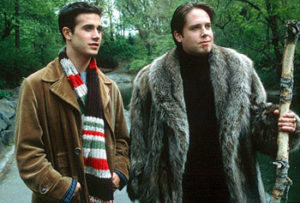“Down to You” doesn’t start with a typical meet cute, staged and unbelievable, but a low key meeting in a dive bar between sophomore Alfred Connelly (Prinze Jr.) and Imogen (Stiles). They talk over music. Al’s a connoisseur and a dreamer, the product of his mother’s influence as a DJ. Imogen is a art major but a pragmatist. “I’m not going to major in it,” she remarks to Al after he sees her artwork in her apartment. “My parents think Fine Arts is for graduate study or something to do on weekends.” But the two have chemistry together, and director/writer Kris Issacson (who has mostly TV movies to his name) is quick to show us this is a nice, relatable couple, and a film that comes off as a more realistic romance than blockbuster rom coms are used to producing.
The film surrounds the couple with likable, though sometimes undefined characters throughout. There’s Shawn Hatosy (“Outside Providence”), Rosario Dawson (“Sin City”), Selma Blair (“Cruel Intentions”), and Zak Orth (“Loser”). Some are hit or miss. Hatosy, who was much more developed in “Outside Providence” here is constrained by a script that wants to paint him as a loose ally to Al, and nothing more – though he does get a scene toward the film’s near conclusion that is written nicely, and paints his character in a sympathetic light. Dawson is drawn extremely thin, assigned to the party girl role with literally no backstory. And Blair, who had much more depth in “Cruel Intentions,” is likewise only skin deep, reduced to an experimental college girl/pornstar, who comes off as jaded and fixated on Al for most of the film.

Of the cast, Orth, who was completely wasted in the aforementioned “Loser,” brings the most solid acting to the film aside from Prinze Jr. and Stiles. As Monk, a friend of Al’s who starts the movie as a newly founded pornstar who Al goes to for advice on love, he later becomes a deep character, with Orth hinting at a solid actor if he continues to pick engaging roles in the future. Smartly, “Down to You” doesn’t center Monk and Al’s advice sessions around sex, as a lazier film would have, but love. “That old and still in love,” Monk observes of an elderly couple in the park. For a film that tries to make the statement that 20-somethings don’t need love in their lives, Monk, Al, and Imogen convince us otherwise, and we willingly follow them along their semi-tragic arcs.
The IMDb description gives much of the movie away in its plot description, but I will not do so here. The film is about love’s ups and downs, focusing specifically on Al and Imogen, and, since the plot is subdued and believable, giving it away here would only damage the charm of the film for those who haven’t seen it. There are ups and downs, but unlike films like “How to Lose a Guy in 10 Days,” we both believe in the central characters’ love and want them to succeed. While Stiles has the most capable acting, the rest of the cast does a passable job with what they have to work with, especially the aforementioned Orth who has a scene near the film’s almost close with Prinze Jr. that more than makes up for his aloofness for much of the film.
 The film is scored typically for the decade, with songs like “Black Balloon” by Goo Goo Dolls and “It All Comes Down to You,” performed by Billie Myers. It’s a credit to the film that the movie’s close, while predictable, doesn’t woo audiences with emotional pop songs, but ends sublimely amidst Barry White’s “Can’t Get Enough Of Your Love Baby.” The film also adds a nice father/son relationship for Al by pairing him with the affable Henry Winkler, and ends believably with questions of how young love can work a second time around.
The film is scored typically for the decade, with songs like “Black Balloon” by Goo Goo Dolls and “It All Comes Down to You,” performed by Billie Myers. It’s a credit to the film that the movie’s close, while predictable, doesn’t woo audiences with emotional pop songs, but ends sublimely amidst Barry White’s “Can’t Get Enough Of Your Love Baby.” The film also adds a nice father/son relationship for Al by pairing him with the affable Henry Winkler, and ends believably with questions of how young love can work a second time around.
At the end of the day “Down to You” isn’t perfect, but is likable, and hints subtly at a deeper film lurking under its young characters’ veneer.
– by Mark Ziobro


